|
21 Palace Street
Canterbury
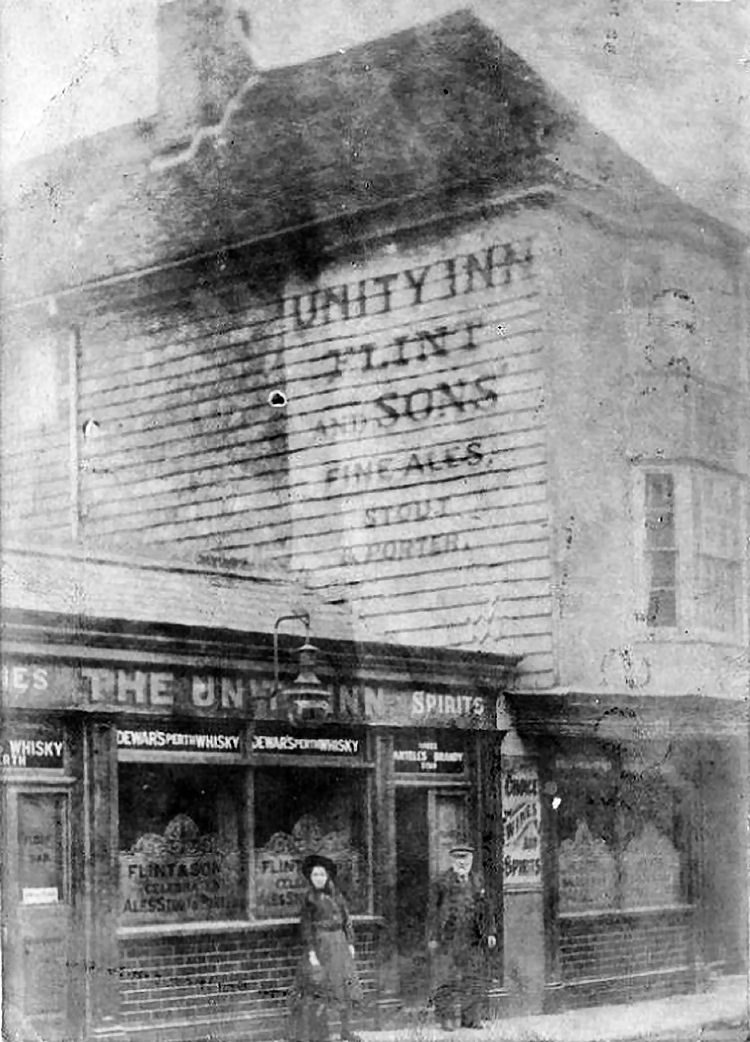
Above photo, circa 1897, kindly sent by Rory Kehoe, |
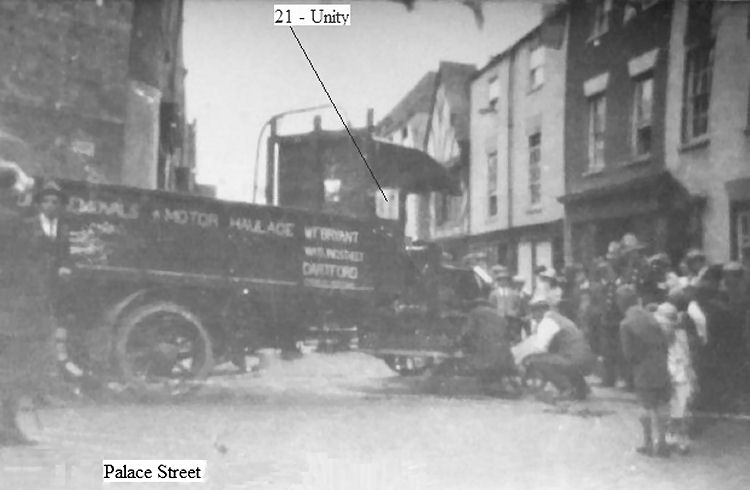
Above photo, circa 1930, kindly sent by Rory Kehoe. |
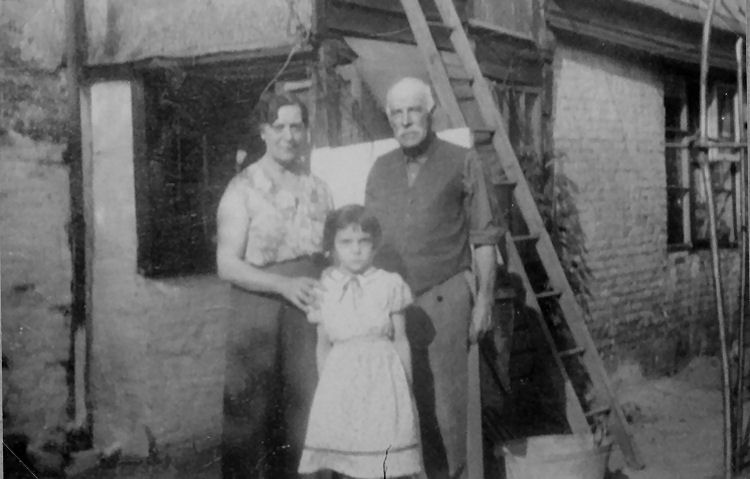
Above photo showing the back garden of 21 Palace Street, circa 1937,
kindly sent by Margaret Axon. Showing Theresa, Margaret and William
White. |
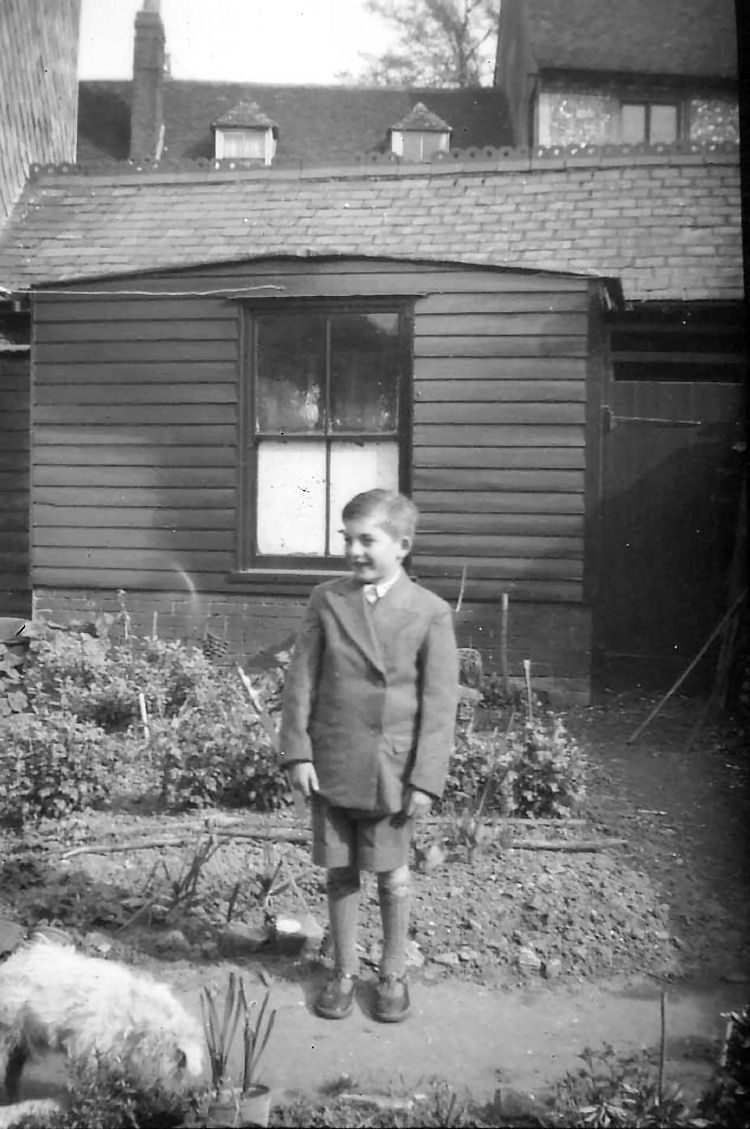
Above photo showing the back garden of 21 Palace Street, circa 1937,
kindly sent by Margaret Axon. Showing Margaret's nephew, Neville Turner. |
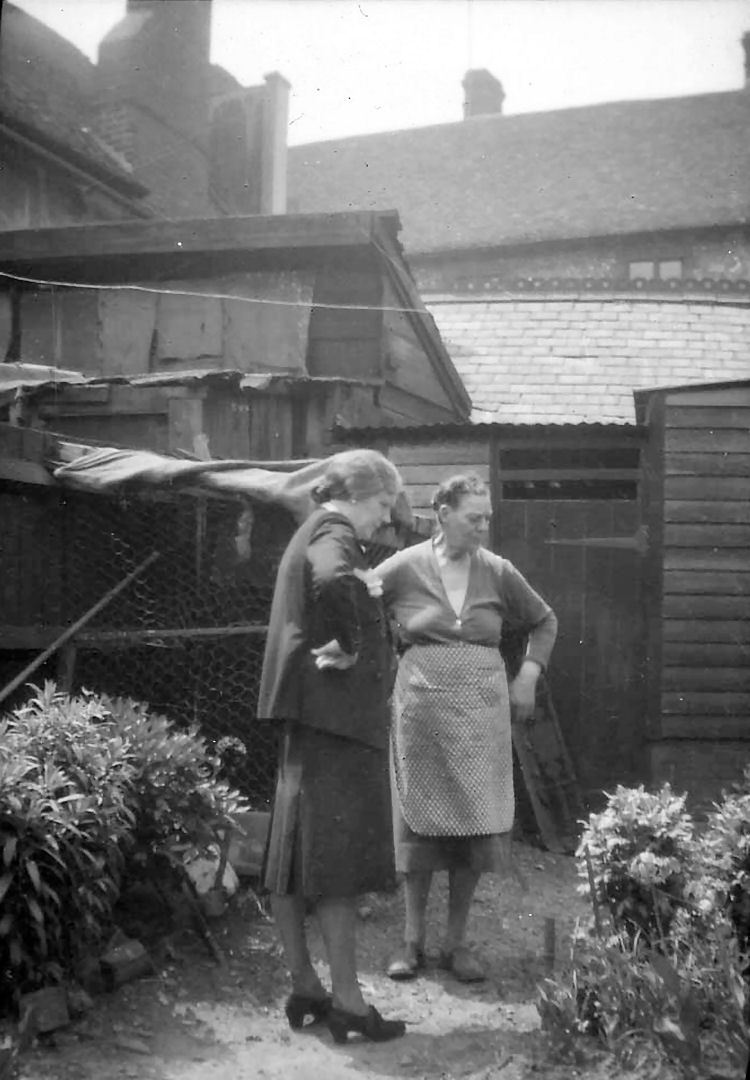
Above photo showing the back garden of 21 Palace Street, circa 1937,
kindly sent by Margaret Axon. Showing friend of family and Theresa
White. |
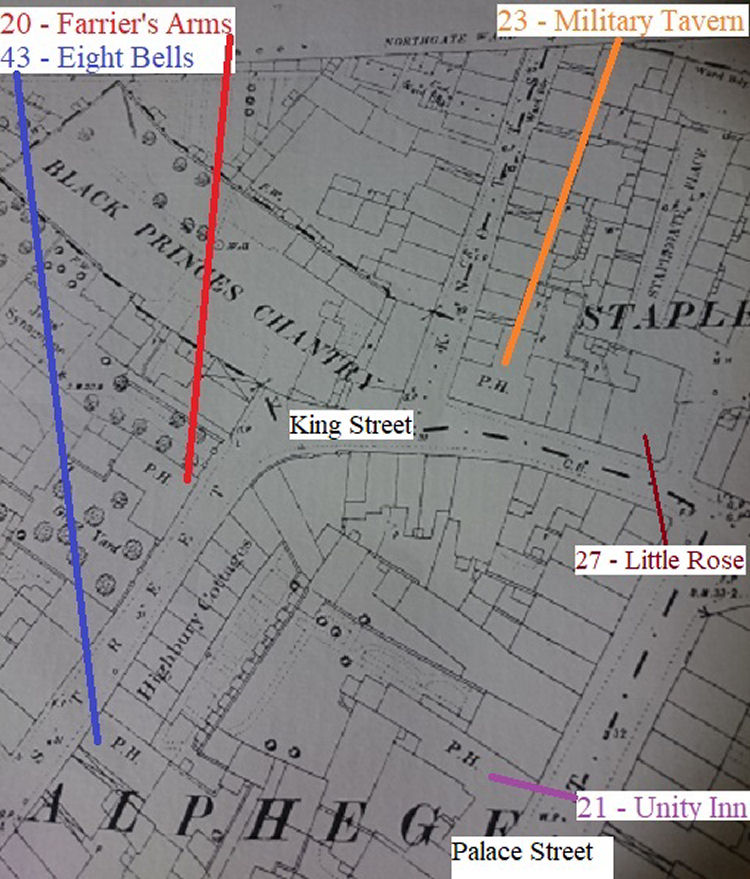
Above 1874 map identification by Rory Kehoe. |
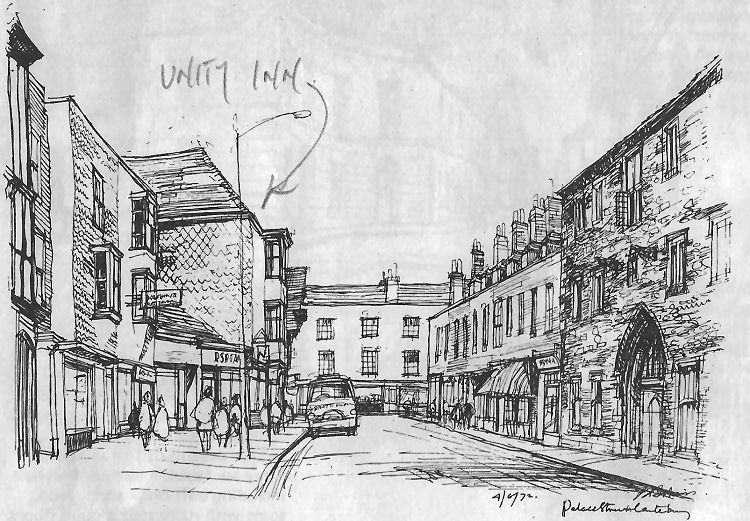
Above print from "City of Canterbury Streets and Buildings," drawing by
John Berbiers. 4 June 1972. |

Above image from Google, July 2009. |
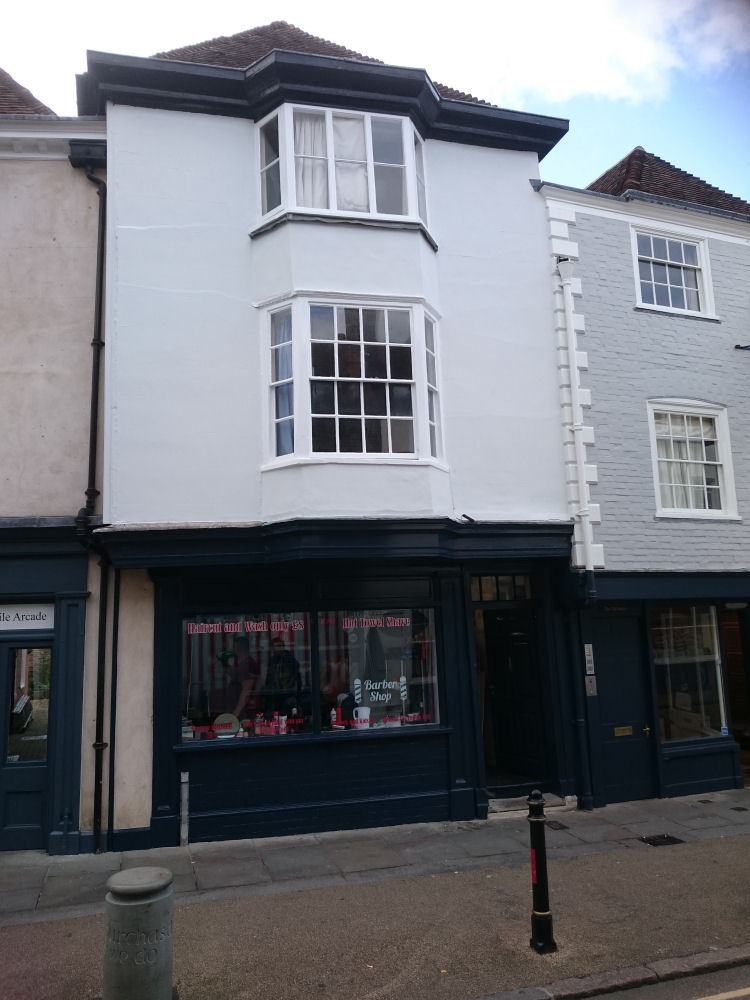
Above photo taken September 2017 by Rory Kehoe. |
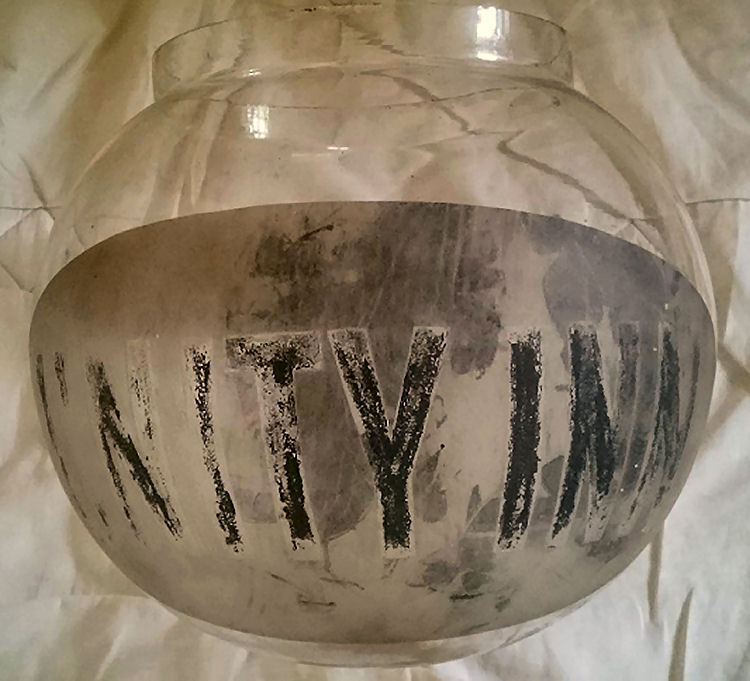
Above photo, kindly sent by Rory Kehoe, who tells me this was the gas
light globe that used to hang outside the pub in the early 1900's. |
In 1838 the premises was used by Hanry Billiter who was a leather cutter.
I also have reference to a Nathaniel Lazarus who was a silversmith and
clothier at the same address, but no date.
Margaret Axon tells me that the ‘shed’ in the back garden is part of the
RSPCA where they used to put down the dogs & cats. In the beginning of the
War they used a small gun to put down the dogs (we used to hear it of an
evening) and chloroform the cats. The area used to smell of Chloroform. The
RSPCA had a clinic twice a week in the evenings. The vet came only when they
had to operate on a pet. A lot of dogs and cats were sadly put down at the
start of the war because people were called up or they were evacuated and
couldn't take pets with them.
|
Canterbury Journal, Kentish Times and Farmers' Gazette, 2 May 1896.
The Same Old Tale.
William Henry Fogarty was summoned to show cause why he should not be
bound over to keep the peace
towards his wife.
Mr. H. Broughton appeared for complainant, the licence holder of the
"Unity Inn" Palace Street, who stated that on Friday last defendant came home drunk about 5:30. During the
morning he took away a sovereign
from a desk in the room behind the bar. When he came home she asked him
for the money and he replied
"If you ask again I will murder you." At the same time he struck her in
the side with his fists, and pushed
her into the kitchen.
Mrs. Manning a neighbour, opened the door and said "Mind, he has a knife
in his hand."
Defendant then desisted, and witness heard something drop. She had
previously seen the knife up his
sleeve. She sent for the police.
Last Sunday week 12th April, he threatened to smash her brains in.
Two sappers of the Royal Engineers came in to her rescue. He had
threatened to murder the children and
himself. She had been married 7 years and had two little girls. She was
afraid defendant would do her some
bodily harm.
By Mr. Mason:- This had been going on for two years, but it was not till
lately he had threatened her with
Knives.
Mr. Mason said it seemed to be a case that aught to come under the new
Act, and a charge of assault
against defendant.
Mr. Broughton said he was not consulted until the summons was taken out,
or he should have advised
complainant to charge him with an assault.
By defendant:- She asked him for the sovereign and he said "If you ask
again I will murder you."
Defendant said he was drunk and told his wife that if she would persist
in asking for the money he would
make himself more drunk, which she did.
Mrs. Jane Mills, widow, residing with complainant, who has her daughter,
stated that defendant threw three glasses and a quart pot at her. He also threatened to dash her brains
out.
Henry Sergeant, sapper in the Royal Engineers Corps stationed at
Canterbury, stated that on the 12th April,
about 12:05 p.m., he was called into the "Unity Inn." He saw defendant
there with two knives in his hand
trying to cut his throat. Witnessed tackled him and took the knives
away. He was slightly cut in doing so.
Henry Hutton, another sapper, who was with the last witness,
corroborated.
Defendant pleaded guilty to the threatening, but said he was always in
drink and a temper when he did it. If
he had left the drink alone he should not have done it, but he could not
make the resolution to do so. He
agreed mutually with his wife to separate if she would take the
children, but she would not have them. He
was willing to part from her, and would leave Canterbury in a few days
and go to his own home.
The Chairman said defendant would be bound over in the sum of £20, and
two sureties of £20 each, to be of
good behaviour for 6-months; in default of his doing so he would have to
go to prison for 2 months. He
would only have to pay the costs, 14s, or in default an extra 7-days.
The money was paid by a friend.
|
|
From the Whitstable Times, 6 January 1900. Price 1½d.
DEATH FROM CONVULSIONS.
The Canterbury Coroner (Dr. F. S. Johnson) held an inquest on Saturday
morning, at the “Unity Inn,” Palace Street, on the body of Thomas May,
the illegitimate child of Sarah May, of 4 Cobden Place.
The mother stated that deceased was 11 weeks. It was delicate from
birth, and was taken ill on Wednesday morning at 6.15. Noticing the
child looked funny she took it in her arms. It gave two little groans,
and then expired.
Susannah Hitchcock gave similar evidence, and said that she had looked
after the child from the time it was five weeks old.
Mr. J. Greasley, surgeon deposed that on Wednesday last he was called to
see deceased, who was said to be dead. About half past six the mother
came and he referred her to the Coroner's officer, as he could do
nothing for a dead child. On Thursday he made a careful external
examination of the body, and was satisfied that deceased had then been
properly nourished and looked after. There were no marks of violence. He
was of opinion that the child had one or more convulsions, and that
death was due to that cause.
The Jury returned a verdict in accordance with the medical evidence.
|
|
From the Whitstable Times and Herne Bay Herald, 4 May, 1867. Price 1d.
EVADING THE CITY TOLLS.
Mr. Thomas Dalby Reeve, a lemonade and soda water manufacturer, of
Margate, was summoned for refusing to pay a toll of 1s. for a cart used
for the purpose of hawking lemonade and soda water about the City. Mr.
Delasaux again appeared for Mr. Solomon, and
called John Goulden who said:- I am a licensed victualler of this city,
and am landlord of the “Unity Inn,” Palace-street. On the 15th of April
Mr. Reeve's servant came to my home, and asked me if I had any orders to
give. I told him I wanted some ginger beer. He said he had not got any
with him, and so I did not have any. I believe the man came in a waggon,
but I did not see any. I told him to bring some ginger beer the next day
he came.
Cross-examined by Mr. Reeve:- You have supplied me with ginger beer for
some months. I am one of your regular customers, and have always paid
for what I had when I received it, and have had a receipted bill, except
on one occasion when I did not pay.
Cross-examined by Mr. Delasaux:- I buy the things at the door. I told
the man to call at my house every time he came in.
The Mayor:- There is no doubt that witness is a regular customer of
defendant's.
Mr. Reeve, who conducted his own case, said he was charged with hawking
lemonade, &c., in a cart on a certain day, and there had been no
evidence adduced to prove that he had even been seen in the cart. Under
the 133rd section of the Public Health Act it was authorised that the
Local Board should appoint some person to collect the tolls, and to have
the Bye Laws, by which the market was regulated, hung up in each market.
He did not know who was the collector, and he had not seen the Bye Laws
hung up in the market.
Mr. Delasaux said he thought everyone knew Mr. Solomon was the
collector.
Mr. Reeve contended that it had not been legally shown in evidence that
Mr. Solomon was the collector.
Mr. Delasaux said that was unnecessary.
The Mayor then announced that the Magistrates found the case not proved,
and they would, therefore dismiss it.
Mr. Reeve was then charged with refusing to pay a toll on the 18th inst.
Mr. Delasaux was about to produce the Bye Laws, when Mr. Reeve said he
would admit them; to spare the time of the Magistrates.
Mr. Delasaux, however, insisted on producing them.
James Knowler said:- I produce the original Bye Laws, which have been
hung up in the Local Board office. I am witness to that fact, and also
to Mr. Solomon being the lessee of the tolls for the city and borough.
Cross-examined by Mr. Reeve:- I remember your coming to our office on
Monday, April 15th, and asking for the Bye Laws, which were on a board
standing near the door. There are several other Bye Laws there. The Town
Clerk transacts his business as Town Clerk, and also his business as
Clerk to the Local Board in that office.
Cross-examined by Mr. Delasaux:- The Bye Lawn were hung up on the 15th
of April, and have been hanging up ever since in the office.
Mr. Martin:- Do you hare your letters or documents addressed to the
office of the Board, or to Mr. Flint, at his private residence?
Witness:- Any letter relating to the Local Board business, is directed
to the Local Board of Health office.
John Tomlin said:- I am a dealer in fish, and reside in Canterbury. I
remember last Thursday, the 18th inst., when I saw defendant's servant
with a waggon in St Margaret's Street I know the waggon belongs to Mr.
Reeve. It was about one o'clock in the afternoon. I saw defendant draw
up in front of the “Freemason's Tavern.” I saw the barmaid come out, and
the man in the cart said “Do you want anything to day?” She said “I will
go and see.” She then went and asked the landlord, and returned again
almost directly, and said “Not to day.”
Mr. Reeve admitted refusing to pay the toll when demanded to do so by
Mr. Solomon. He contended that in the indictment he was changed with
hawking. He said that Dr. Walker's definition of hawking was to sell by
proclamation in the streets. Ha was not in the habit of selling by
proclamation in the streets. He then called John Nethersole, who said he
was in the employ of Messrs. Reeve and Co., at Margate. He travelled
with their waggon, and called on their regular customers by their
(Messrs. Reeve and Co's) orders. He remembered going to the “Freemason's
Tavern” on the 18th inst. He there saw the last witness.
Cross examined by Mr. Delasaux:- I was ordered to call at the
“Freemason's Tavern” on the 18th inst by the landlord. I asked the bar
maid if there were any empty bottles or orders. The house has lately
gone into different hands. I used to call on the previous landlord. He
was one of our customers.
The Court was then cleared, and on the re-admission of the public. The
Mayor said:- The Magistrates are divided on the subject, and, therefore,
have come to no decision.
Mr. Solomon then said he should take out another summons against Mr.
Reeve for the last case, and also one for refusing to pay on that day.
|
|
Kentish Gazette, 25 January 1876.
ANOTHER SUDDEN DEATH.
Yesterday evening week an inquest was held at the "Unity" public
house, Palace Street, before Mr. Coroner Delasaux, on the body of a
man named Alfred Hutching, in the employ of Mr. Leech, general
dealer, who died suddenly on Saturday night. A witness named
Deverson stated that the deceased was in the "Unity" on Saturday
evening, between 8 and 9, obtaining some tobacco, when his head
suddenly fell upon his right shoulder. He was removed to another
room, and died about twenty minutes afterwards. Mr. Frank Wacher,
surgeon, deposed to making a post-mortem examination of the body,
and t finding a large clot of blood in the pericardium of the heart,
caused by the rupture of a large vessel near the heart; the rupture
was caused by aneurism. It was a natural death. The jury returned a
verdict in accordance with this testimony. The unfortunate man has
left a widow and six children, and Mr. William Mount, of the
Borough, has kindly undertaken to receive subscriptions towards a
fund for relieving their distress.
|
|
From the Whitstable Times and Herne Bay Herald. 9 March 1901. Price 1d.
AN INFANTS SUDDEN DEATH.
The City Coroner (Dr. T. S. Johnson) held an inquest at the “Unity Inn,”
Palace Street, Canterbury; on Saturday, touching the death of an
illegitimate child of Esther Nye. Esther Nye, the mother, stated that
she was the widow of William Nye, a carter. She took the deceased to bed
on Thursday night and on the following morning about twenty minutes to
eight the child became very black round the mouth. Witness got out of
bed and called in her neighbour, Mrs. Desborough, to look at the child.
She said it was dead. The child was five weeks old. It was not
registered nor baptised.
The Coroner said it was a case of barbarism.
Anna Maria Desborongh, living at Cobden Place, Canterbury, wife of
Edward Desborough, a cab driver in London, stated that she was called in
to see the deceased on the morning in question. She went in and found
the child dead. Witness then went for Mr. Wacher.
Mr. Frank Wacher, surgeon, stated that he was called to see the deceased
and on his arrival he found it dead. There were no external marks of
violence. The deceased was very blue about the mouth. Death was due to
convulsions.
The jury returned a verdict of Death from Natural Causes.
|
|
From the Whitstable Times and Herne Bay Herald, Saturday 19 February 1916.
A LICENSEE SUMMONED.
At the Canterbury Police Court on Friday Miss Grace Wood, the licensee
of the "Unity Inn," Palace Street, was summoned for permitting
drunkenness on her premises on January 22nd. The case arose out of the
conviction of a man named Haddlestone for being found drunk at the
"Unity." Mr. R. H. Arrowsmith appeared for the defendant, who in the
witness box stated that there was nothing in the behaviour of
Huddlestone, as he sat in the saloon, to draw her attention to him. And
he did not come into the bar. Trooper P. Downman, of the East Kent
Yeomanry, and Trooper F. Smith, of the 3rd Cavalry Reserve, both stated
that there was nothing in the behaviour of Huddlestone to make one think
that he was drunk.
The Bench dismissed the case. |
LICENSEE LIST
GOULDEN F Sept/1866+

GOULDEN J 1868+

JONES Charles 1874+

SIBLEY Charles 1881-82+
(age 53 in 1881 ) ) 
LEACH Mrs Clara 1891+

 DOBSON William
DOBSON William  1895
1895
FOGARTY Mrs 1896+
SETTERFIELD Henry J 1901-03+ (age 55 in 1901 ) )
  
PRUDEN Mary Mrs 1911-13+ (age 46 in 1911 ) )

WOOD Mrs Grace 1916-22+

BAKER Henry 1930+

https://pubwiki.co.uk/UnityInn.shtml
 Canterbury
Journal, Kentish Times and Farmers' Gazette Canterbury
Journal, Kentish Times and Farmers' Gazette
 Greens
Canterbury Directory 1868 Greens
Canterbury Directory 1868
 From the Post Office Directory 1874 From the Post Office Directory 1874
 Census Census
 From the Post Office Directory 1882 From the Post Office Directory 1882
 From the Post Office Directory 1891 From the Post Office Directory 1891
 From the Post Office Directory 1903 From the Post Office Directory 1903
 From the Kelly's Directory 1903 From the Kelly's Directory 1903
 From the Post Office Directory 1913 From the Post Office Directory 1913
 From the Post Office Directory 1922 From the Post Office Directory 1922
 From the Post Office Directory 1930 From the Post Office Directory 1930
 Historic
Canterbury web site www.machadoink.com Historic
Canterbury web site www.machadoink.com
 Census Census
|









